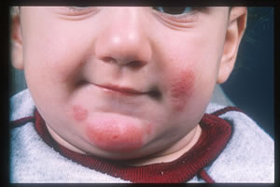How to manage and prevent your child's eczema flares

Up to 10 per cent of children under the age of five develop eczema. The disease in a child calls for special attention. Below are some tips for helping to prevent and provide ongoing lifestyle management of your child's eczema flares.
Prevention of flares
You can prevent most of your child's severe eczema flares by proactively treating them when they first appear (i.e. at the first signs of itch and redness). Ask your doctor or pharmacist for an Eczema Control Plan for your child to prevent and treat their eczema flares.
The Eczema Control Plan, now available in most pharmacies nation-wide, identifies and promotes understanding of the three stages of eczema:
1. Clear skin
2. First itch; and
3. Redness and full flare.
The plan is designed to break the eczema cycle by helping minimise the number of severe flares that your child experiences. It offers a treatment regimen that effectively treats the skin disease at each stage. The plan recommends that when itch and redness first occurs, you should use a flare prevention product to prevent the majority of your child's flares. When a full flare does break through, you should use a topical steroid cream.
An Eczema Control Plan empowers you, as a parent and carer, to better control your child's eczema flares by taking sound preventative measures.
Lifestyle management of flares
There are a number of lifestyle changes that you can make to help manage your child's eczema flares, as follows:
Moisturise your child - bathe them in lukewarm water for up to five minutes using non-soap cleansers
After bathing your child, pat their skin dry and apply a moisturising cream or ointment within three minutes
If night-time itching is a problem, use a cold, damp washcloth to soothe your child's skin, followed by a moisturiser and sedating antihistamine, under the guidance of your doctor
Dress your child in 100 per cent cotton clothing to reduce sweating
Keep your child's room at an even temperature and use a humidifier in dry or heated rooms to keep the air moist
Avoid wool and other coarse or rough-textured clothing or blankets and if possible, remove wool carpets
Use protective coverings for pillows and mattresses and wash bedclothes frequently in hot water
Keep pets off beds and other furniture, or outside.
Easing the emotional burden
Children, like adults, experience emotional stress which can exacerbate their eczema. To help your child cope with their illness, it's important to develop and maintain a routine. Anyone who cares for your child should also keep to this routine. Talk to your child about eczema and inform him/her about what may trigger the disease and how to avoid these things.
Explain the importance of treatment and how necessary it is to use moisturiser and medications, particularly at the first sign of itch and redness. Also teach your child to field comments about their eczema from other children and even adults.
If your child is old enough, help him/her find ways to explain that the disease is not contagious and how to discuss it with their friends at school.
Most importantly, inform your child that in all likelihood, their eczema will get easier to live with as they grow older and they may even outgrow it.
Information courtesy of the Eczema Association of Australasia Inc.
For more information about how to prevent and manage your child's eczema, please contact the Eczema Association of Australasia Inc. on 1300 300 182 or go to www.eczema.org.au
Prevention of flares
You can prevent most of your child's severe eczema flares by proactively treating them when they first appear (i.e. at the first signs of itch and redness). Ask your doctor or pharmacist for an Eczema Control Plan for your child to prevent and treat their eczema flares.
The Eczema Control Plan, now available in most pharmacies nation-wide, identifies and promotes understanding of the three stages of eczema:
1. Clear skin
2. First itch; and
3. Redness and full flare.
The plan is designed to break the eczema cycle by helping minimise the number of severe flares that your child experiences. It offers a treatment regimen that effectively treats the skin disease at each stage. The plan recommends that when itch and redness first occurs, you should use a flare prevention product to prevent the majority of your child's flares. When a full flare does break through, you should use a topical steroid cream.
An Eczema Control Plan empowers you, as a parent and carer, to better control your child's eczema flares by taking sound preventative measures.
Lifestyle management of flares
There are a number of lifestyle changes that you can make to help manage your child's eczema flares, as follows:
Easing the emotional burden
Children, like adults, experience emotional stress which can exacerbate their eczema. To help your child cope with their illness, it's important to develop and maintain a routine. Anyone who cares for your child should also keep to this routine. Talk to your child about eczema and inform him/her about what may trigger the disease and how to avoid these things.
Explain the importance of treatment and how necessary it is to use moisturiser and medications, particularly at the first sign of itch and redness. Also teach your child to field comments about their eczema from other children and even adults.
If your child is old enough, help him/her find ways to explain that the disease is not contagious and how to discuss it with their friends at school.
Most importantly, inform your child that in all likelihood, their eczema will get easier to live with as they grow older and they may even outgrow it.
Information courtesy of the Eczema Association of Australasia Inc.
For more information about how to prevent and manage your child's eczema, please contact the Eczema Association of Australasia Inc. on 1300 300 182 or go to www.eczema.org.au
MORE



